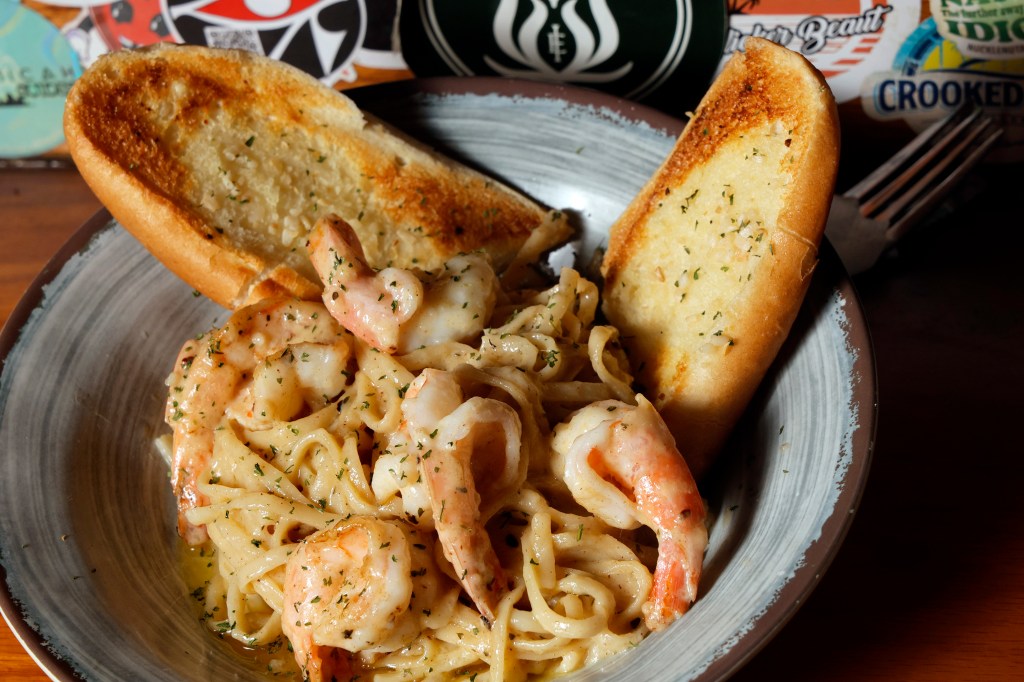Picture luxuriating at a waterfront restaurant decked out in fishing nets, oars and shrimping boat pictures, where servers wear shirts featuring some variation of, “We catch it, you eat it!” If you order peel-and-eat shrimp, you might reasonably expect they were fished from nearby waters, right?
Wrong, argues commercial fisheries scientist Dave Williams, who found the opposite at most of the 44 Broward County restaurants he and and other undercover testers dined at this summer. The testers, from Williams’ Texas-based company SeaD Consulting, visited randomly selected seafood spots and used rapid genetic tests to prove whether the shrimp advertised as local actually came from local waters.
For a region known for megayachts and fresh catches, Williams said the study “shocked” him: Results released by the company on Oct. 1 revealed that 39 out of 44 tested restaurants served farm-raised, imported shrimp — and 26 of them passed that shrimp off as locally caught, duping diners into paying more for pricier seafood.
Only five restaurants, the company said, served authentic domestic or wild-caught shrimp:
Evelyn’s at the Four Seasons Hotel and Residences Fort Lauderdale, 525 N. Fort Lauderdale Beach Blvd.
Grumpy Gary’s, 318 N. Federal Highway, Dania Beach
Luc’s Seafood and Grill, 5511 S. University Drive, Davie
Truluck’s, 701 N. Fort Lauderdale Beach Blvd., Suite CU-1, Fort Lauderdale
World Famous Parrot Lounge, 911 Sunrise Lane, Fort Lauderdale
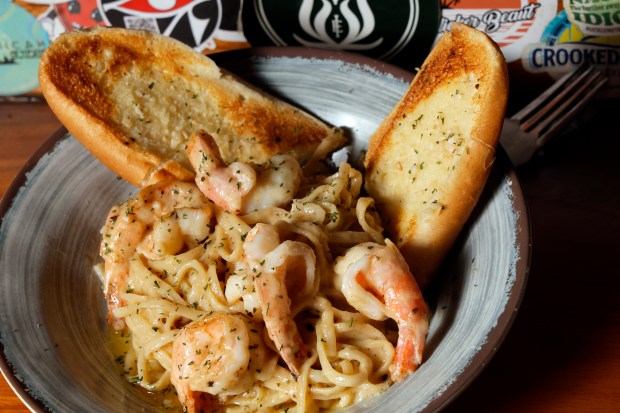
Amy Beth Bennett / South Florida Sun Sentinel
ONE OF THE RESTAURANTS DOING IT RIGHT: Key West pink shrimp alfredo at the World Famous Parrot Lounge in Fort Lauderdale, one of five Broward County restaurants found to serve authentic domestic or wild-caught shrimp. (Amy Beth Bennett/South Florida Sun Sentinel)
Williams said he’s using the genetic technology to expose more restaurants and stop a “desperate” problem: More local eateries are misrepresenting inferior shrimp fished thousands of miles away as Gulf shrimp, helping an import industry known for labor abuses while harming Florida’s multigenerational shrimping communities.
“They’re definitely defrauding consumers,” Williams told the South Florida Sun Sentinel. “Restaurants are substituting local shrimp for far-less expensive imported shrimp in order to increase their margins, and this substitution is destroying our Gulf shrimping industry.”
But SeaD Consulting, Williams is quick to add, isn’t “a gotcha organization.” He declined to name any restaurants caught serving imported shrimp because it “might not necessarily be their fault,” or they were “misinformed and got the wrong seafood by mistake.”
SeaD Consulting created its peer-reviewed, patent-pending genetics test in collaboration with Prashant Singh, a food-safety microbiologist at Florida State University. Singh said their RIGHTTest is portable and works by using a centrifuge and heating device to identify shrimp DNA against 400 tissue samples preserved at FSU’s lab, adding that it can also produce rapid results in the field in as little as two hours.
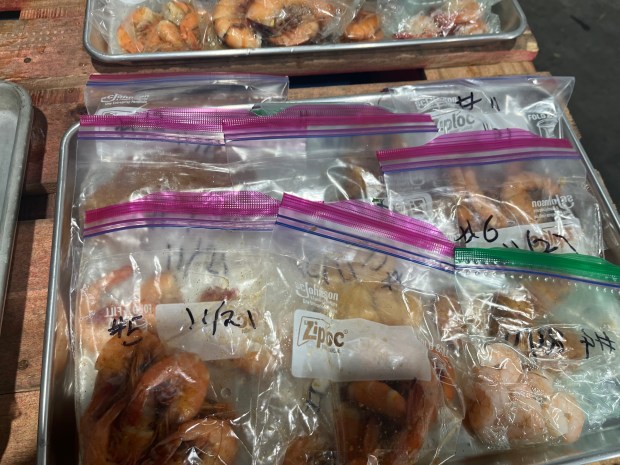
SeaD Consulting / Courtesy
After buying shrimp from restaurants, undercover testers from SeaD Consulting bag, label and freeze the samples before sending them to a Florida State University laboratory for genetic testing. (SeaD Consulting/Courtesy)
“I would pull out all the shrimp tissue samples from my bank whenever I’m testing,” Singh explains. “When those samples are matching [Food and Drug Administration]-level results, it gives me a high degree of confidence in my work.”
South Florida isn’t the first market SeaD Consulting has scrutinized since ramping up testing efforts in late 2024. Williams’ company also visited Savannah, Georgia, and Wilmington, North Carolina, which each tallied 77% inauthenticity. New Orleans performed best with just 13% of restaurants mislabeling their shrimp, while the Tampa/St. Petersburg area fared the worst: Only two out of 44 restaurants tested served real Gulf shrimp.
“I don’t have issues against imported shrimp, but I do have a problem with mislabeling,” Singh adds. “Every time they sell imported products as domestic, they are stealing off the plates of domestic shrimpers, who get nothing. That doesn’t sound fair.”
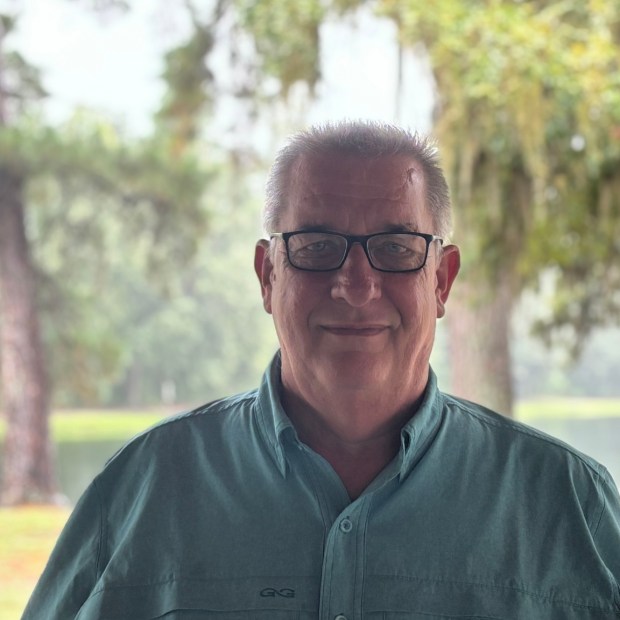
SeaD Consulting / Courtesy
Commercial fisheries scientist Dave Williams and a team of undercover testers visited 44 Broward County restaurants earlier this summer to determine whether eateries misrepresented their seafood offerings. (SeaD Consulting/Courtesy)
‘It’s just offensive’
Mislabeling seafood products in Florida is illegal, and anyone convicted of seafood fraud can be sentenced to up to a second-degree misdemeanor — $500 or up to 60 days in jail — under Florida law.
In September 2024, the Federal Trade Commission published guidance aimed at restaurants that “bend the rules by using pictures, symbols, or other things to make people believe something about what they are selling without actually saying the words. That’s an implied claim. If it’s not true, it’s just as illegal as an outright lie.”
Last October, Alvaro Bedoya, then an FTC commissioner, sent letters to the nation’s 10 highest-grossing seafood restaurants, including Red Lobster and Long John Silver’s, warning that false advertising about locally caught fare could be investigated, he told Reuters.
“This is a new reminder to companies that it is all of the ways you’re communicating to a consumer, the net impression of that communication needs to be accurate,” Bedoya said in the article.
Even so, Florida laws aren’t tough enough to crack down on mislabeled seafood — and the imports aren’t stopping, said Debbie Long, a spokesperson for New Port Richey-based Southern Shrimping Alliance, which is funding SeaD Consulting’s field tests.
Beyond exposing consumer fraud, Long said this testing sheds light on the dying livelihood of catching shrimp in the Gulf of Mexico, as Gulf shrimpers reel from worker shortages, expensive diesel fuel and a flood of cheaply imported shrimp from India, Vietnam, Indonesia and Ecuador.
“It allows unfair competition to outcompete U.S. shrimpers,” Long said. “It’s just offensive.”
Commercial landings data from the Florida Fish & Wildlife Conservation Commission illustrates the punishing economics. In 2015, 7.4 million pounds of pink shrimp were harvested statewide, valued at $17.2 million. That’s down compared with 4.4 million pounds harvested in 2024 at a value of $8.1 million.
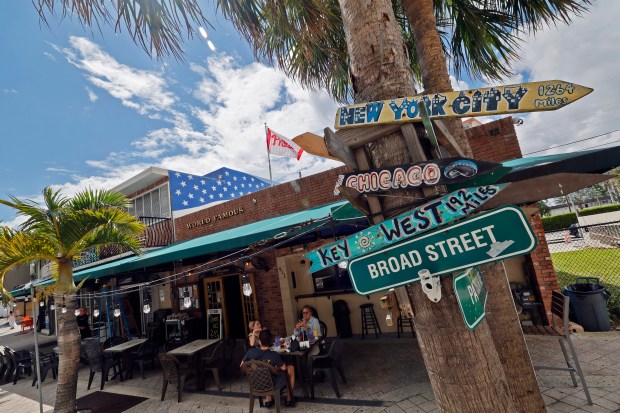
Amy Beth Bennett / South Florida Sun Sentinel
The World Famous Parrot Lounge in Fort Lauderdale has been open since 1970 and serving Key West pink shrimp since 2017. Testing by SeaD Consulting found it was one of five Broward County restaurants serving authentic domestic or wild-caught shrimp. (Amy Beth Bennett/South Florida Sun Sentinel)
Parrot Lounge: ‘Eat some pink shrimp’
One of the Fort Lauderdale restaurants serving local shrimp proven by the testing as authentic, the World Famous Parrot Lounge is a breezy seaside landmark near Sunrise Boulevard and State Road A1A that has pumped out burgers, Philly cheesesteaks and seafood since 1970.
Co-owner Joe O’Donnell, who’s worked at the Parrot since 1978 and classifies it as a “Philly bar,” said the bestsellers are cheesesteaks — but not far behind are the Key West pink shrimp, a menu staple since 2017.
“Sometimes we got to remind the Philly visitors to eat some pink shrimp,” O’Donnell said with a laugh. “Like, c’mon, you can get a cheesesteak anytime, would you please eat something local to the economy?”
The restaurant-bar offers pink shrimp in many configurations: Beer-battered, coconut-breaded or grilled for tacos, quesadillas and shrimp scampi. While it costs him $3 more per pound compared with “shrimp shipped in from overseas,” O’Donnell said it’s far more delicious.
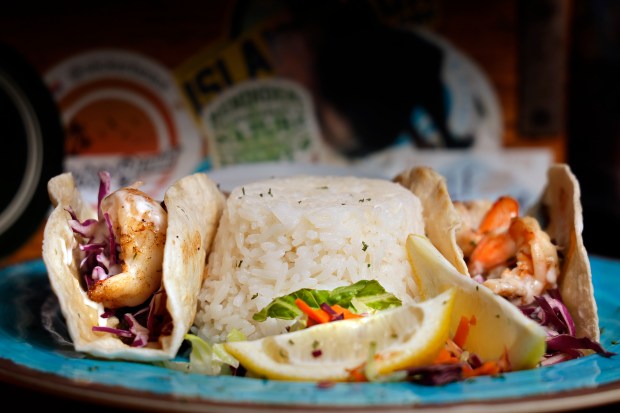
Amy Beth Bennett / South Florida Sun Sentinel
Grilled pink shrimp tacos at the World Famous Parrot Lounge in Fort Lauderdale on Thursday, Oct. 9, 2025. Testing by SeaD Consulting found it was one of five Broward County restaurants serving authentic domestic or wild-caught shrimp. (Amy Beth Bennett/South Florida Sun Sentinel)
“The imported stuff hurts the industry all through the Gulf, so I’m glad we can at least contribute something,” said O’Donnell, adding that the Parrot also does monthly beach cleanups. “Most times, you taste the difference. It’s nice to have seafood you know came just off the boats.”
And that’s the reason tourists visit South Florida in the first place, argues Williams, the commercial fisheries scientist.
“The reason people come down to Florida is because they want good-quality, fresh seafood,” he said. “You can get frozen shrimp from India at the grocery store. Here we have a protein source that’s wild and fully sustainable, but we’re just not harvesting it.”

